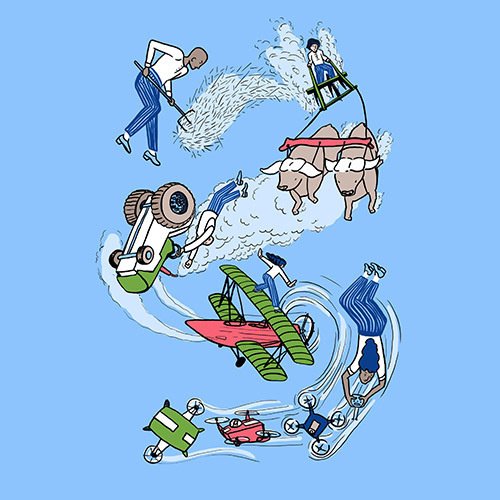Do Androids dream of stealing our jobs?
Jul 22, 2019
4 mins

In 2013, Frey & Osborne came to a startling conclusion about the impact of automation, the process of substituting human labour with robotics or artificial intelligence: 47%of current US occupations are at high risk of being replaced by machines. This revived a timeless debate that has pervaded recent history. From the early 19th century Luddites, angry at the introduction of textile machinery, to ongoing scholarly discussions over the viability of driverless vehicles, techno-optimists and techno-pessimists have clashed over the impact of technology on the labour market.
The reality is, workplace disruptions are not so much about flashy technology, like Softbank’s Pepper, a social humanoid robot built to engage with people, or Rethink Robotics’ Sawyer, a teachable industrial robot. Instead, the real impact lies in the austere management techniques that optimized production lines, pioneered by the likes of Ford, Taylor, and Toyota. Here’s a visual example, noted by American economist Gordon: look around your office. What technology wasn’t around two decades ago? Computers, printers, a phone, and an internet connection still make up the core infrastructure of the modern office. Sure, there might be an Alexa or Google Assistant thrown in, but they’re effectively streamlined computers, made user friendly with voice commands.
Look around your office. What technology wasn’t around two decades ago? Computers, printers, a phone, and an internet connection still make up the core infrastructure of the modern office.
Industrial revolutions and social movements
Past industrial revolutions, in addition to invoking awe and wonder, were always accompanied by waves of jobs made redundant. This was followed by the sudden emergence of new professions. To name a recent example—for centuries, the word “computer” was a job title describing a person carrying out calculations in the workplace. Now it’s a machine. But decades ago, you were more likely to find job titles such as Digital Content Manager or Cybersecurity Analyst in science fiction novels by William Gibson and Philip K. Dick than in the workplace.
Social movements would ride the revolutions’ momentum, and the relationship between employees and their work would shift radically. Most modern safety nets, such as minimum wage, limited working hours, or unemployment benefits date back to the consecutive industrial ages of the late 19th to early 20th century. No surprise then, that a plethora of academics and journalists have made it their life’s work to analyse the exciting disruptions of the Digital Age—optimistically dubbed the 4th Industrial Revolution—and its fantastical implications for society.
On the other hand, the shape of the office, and its culture, have dramatically changed, from cubicles to open space, to remote working and collaborative workspaces. Bouncing on the back of digitalisation, companies have created new ways to work: partaking in crowdsourcing, such as Amazon’s MTurk, or by profiting from the shared economy—all made possible by creative usage of the internet. Management can be centralised, gone is the need for local offices, and projects are seamlessly supported by a variety of advanced management software. While impressive, these innovations remain incremental, and the core technology is unchanged.
Work is not just about economic security
Still, there is continued faith by techno-optimists that this time, a rush of new, groundbreaking technologies in the Digital Age will significantly redefine work. Robotisation will certainly disproportionately hit the manufacturing industry. Driverless vehicles threaten to disrupt the 10,5 million people employed in Europe’s transport sector, barring regulation. Even if automation does not completely replace a job, it will certainly affect it—across all levels of skills and management—as shown by McKinsey’s 2017 report.
The economist Keynes, ever the techno-optimist, saw nothing wrong with a future where all jobs were automated. He argued this society would allow humans to commit fully to leisure. Unfortunately, even this utopian perspective creates a conundrum: one’s profession is not just about economic security. Work fosters an identity, a community, a greater sense of self. For example, in the post-Fordism age of mass manufacturing, schools such as Les Compagnons du Devoir, which traces its origins to the medieval ages, continue to train artisan blacksmiths. There exists a niche market for their skills—but they do it for the craft, the history of their work, and the passionate community dedicated to keeping it alive. If robots have even the faintest possibility of wiping out that type of legacy, across any profession, there arises an implicit understanding one’s work is superfluous, and expendable.
Understanding work this way explains why international trade and immigration make such easy scapegoats for populists, despite evidence showing the decline in manufacturing jobs in the West from the 1990s and onwards is primarily caused by technology. This dominant narrative implies blue collar workers can get their job back from the ‘other’, suggesting their profession has only been relocated to a different country, rather than made redundant by a metal box. Contrary to the fantasy offered, those jobs are forever lost to technology. The economic reality is that businesses need automation to stay competitive, and are thus hesitant to reverse digitalisation efforts. After all, how can humans compete against machines that do not tire, are able to process information considerably faster, and whose every action is accountable?
This can be developed through a culture of continuous training, ensuring not only that employees are given room for creativity, but they have the confidence required to tackle the inevitable appearance of unfamiliar technology in the workplace, and to use it to its fullest potential.
Digitalisation is a fantastic driver for competitiveness
Beyond economic security, it is this alienating cost of innovation that needs to be dealt with by implementing effective, and emphatic safety nets. Thankfully, solutions do exist. With digitalisation, adaptability is key. Digitalisation is a fantastic driver for competitiveness, but the timeless skill of adaptive thinking is what led Ford and Toyota to stand out. This can be developed through a culture of continuous training, ensuring not only that employees are given room for creativity, but they have the confidence required to tackle the inevitable appearance of unfamiliar technology in the workplace, and to use it to its fullest potential. Practical solutions include workshops introducing robots to employees, and pooling their recommendations on how automatons can be best used to support their work, thereby returning agency to workers. Teaching employees how to code, especially languages such as Python which are both easy to learn, and the standard for automating tasks, ensures they can even use these new tools to supplement their daily work.
Robots are unlikely to wipe out all jobs, for now, but learning to work alongside them, while placing a premium on the soft skills invaluable in all jobs—communication, leadership, creativity, empathy—ensures that even disrupted workers have the means to flourish in their next profession.
As for the companies themselves, in an age of disruption, when there are no shortage of miraculous, game-changing technologies—peddled by entrepreneurs as the next best thing after cryptocurrencies—executives should also be wary of falling for very expensive, and often short lived, bubbles.
Illustration: Eddie Stok

More inspiration: Employer branding

Is cultural add the new cultural fit?
A growing number of companies are swapping the question “What’s a good fit?” for “What’s missing?”
Jun 28, 2023

How to make your Glassdoor page an asset
50 million unique visitors flock to the Glassdoor social platform, making it the second most popular job site in the United States.
Feb 23, 2021

Recruitment marketing: the future of talent acquisition?
Recruitment marketing is the combination of digital technology and recruitment techniques to acquire high-quality talent.
Sep 16, 2019

How blockchain could transform the core of HR
Accelerate fundamental HR processes, secure payroll, verify candidate's informations ... what blockchain brings to HR.
Aug 12, 2019

The American Dream in Europe?
This study highlights a global reflection on the new challenges of the entrepreneurial culture in France and the ecosystem that accompanies it.
Aug 09, 2019
Inside the jungle: The HR newsletter
Studies, events, expert analysis, and solutions—every two weeks in your inbox

